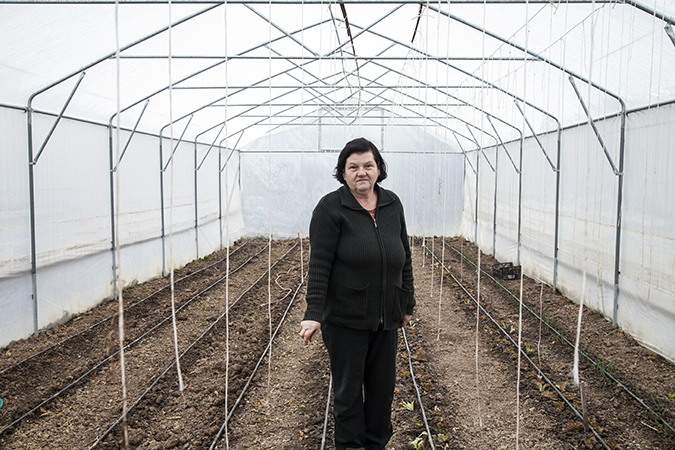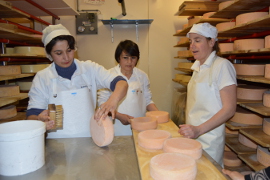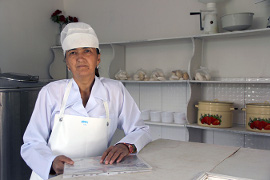SDG 2: End hunger, achieve food security and improved nutrition and promote sustainable agriculture
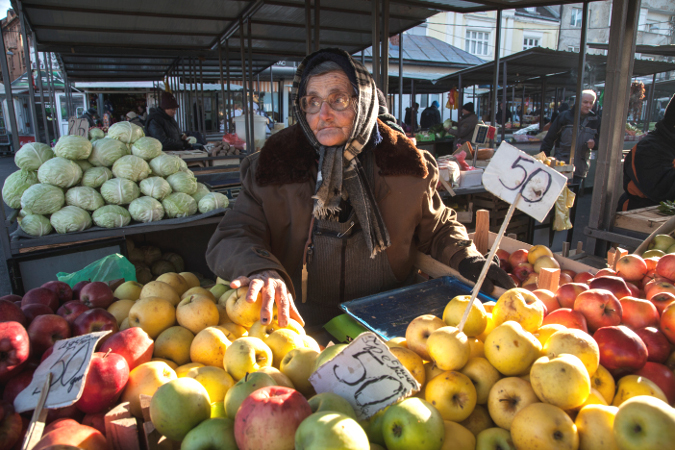
Targets
- By 2030, end all forms of malnutrition, including achieving, by 2025, the internationally agreed targets on stunting and wasting in children under 5 years of age, and address the nutritional needs of adolescent girls, pregnant and lactating women and older persons.
- By 2030, double the agricultural productivity and incomes of small-scale food producers, in particular women, indigenous peoples, family farmers, pastoralists and fishers, including through secure and equal access to land, other productive resources and inputs, knowledge, financial services, markets and opportunities for value addition and non-farm employment.
- By 2030, end hunger and ensure access by all people, in particular the poor and people in vulnerable situations, including infants, to safe, nutritious and sufficient food all year round.
- By 2030, ensure sustainable food production systems and implement resilient agricultural practices that increase productivity and production, that help maintain ecosystems, that strengthen capacity for adaptation to climate change, extreme weather, drought, flooding and other disasters and that progressively improve land and soil quality.
- By 2020, maintain the genetic diversity of seeds, cultivated plants and farmed and domesticated animals and their related wild species, including through soundly managed and diversified seed and plant banks at the national, regional and international levels, and promote access to and fair and equitable sharing of benefits arising from the utilization of genetic resources and associated traditional knowledge, as internationally agreed.
- Increase investment, including through enhanced international cooperation, in rural infrastructure, agricultural research and extension services, technology development and plant and livestock gene banks in order to enhance agricultural productive capacity in developing countries, in particular least developed countries.
- Correct and prevent trade restrictions and distortions in world agricultural markets, including through the parallel elimination of all forms of agricultural export subsidies and all export measures with equivalent effect, in accordance with the mandate of the Doha Development Round.
- Adopt measures to ensure the proper functioning of food commodity markets and their derivatives and facilitate timely access to market information, including on food reserves, in order to help limit extreme food price volatility.
Hunger has a woman’s face. In nearly two-thirds of countries, women are more likely than men to report food insecurity. Central and Southern Asia is the region with the largest gaps, with women being 4 percentage points more likely than men to report food insecurity. In Europe and Northern America, 9 per cent of women and 8 per cent of men reported food insecurity. The gaps however vary across countries: In Ukraine, for example, 19 per cent of women and 14 per cent of men reported food insecurity. The world’s worst food insecurity is in sub-Saharan Africa, affecting half the population. Yet, 10 per cent of women in the United Kingdom also cannot count on having enough nutritious food, a share slightly higher than for men.
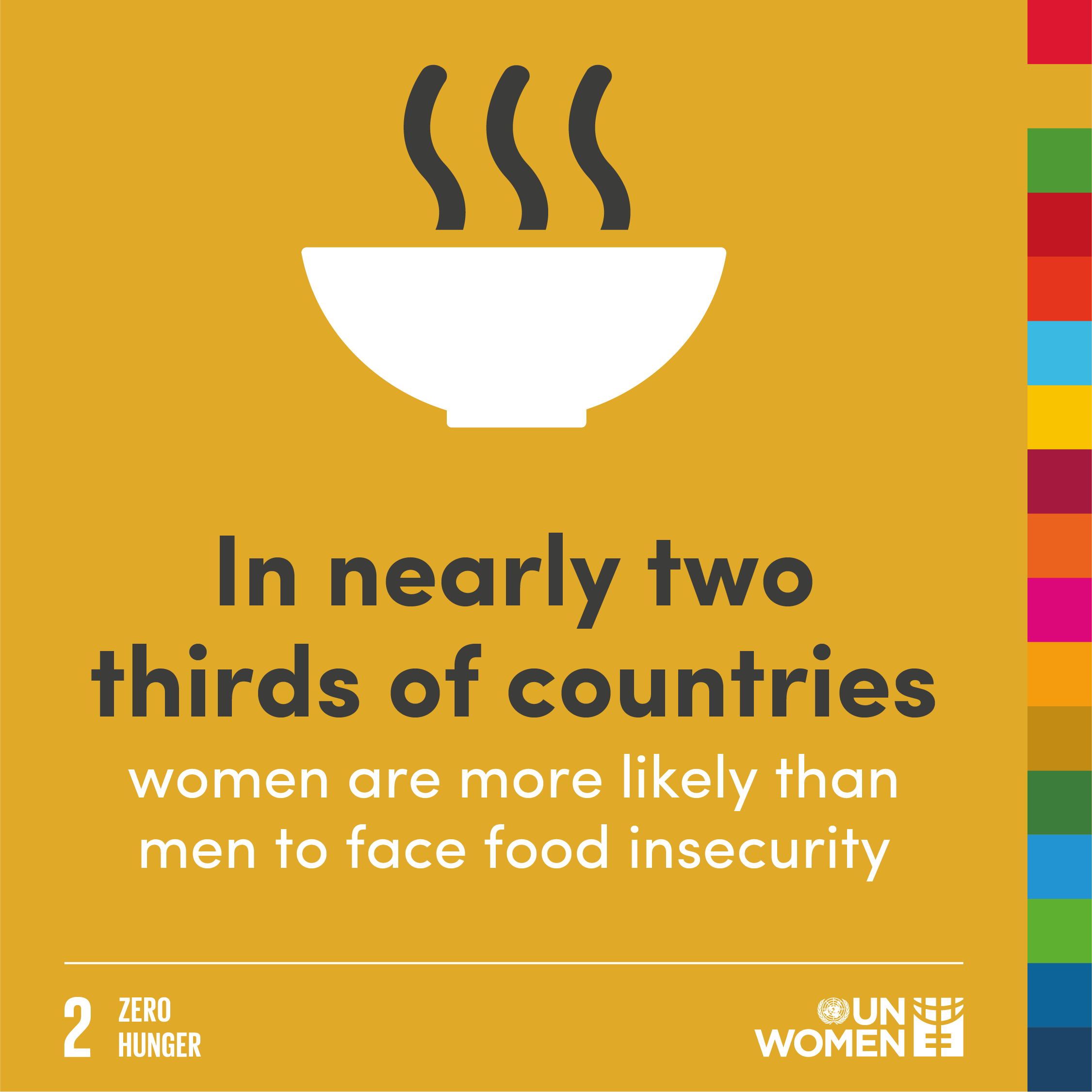
Women and girls prepare most of the world’s household meals and grow much of its food. Globally, almost one third of employed women work in agriculture, not accounting for self-employed and unpaid family workers. Yet, only 13 per cent women are landholders. In some parts of the world, such as South Asia and sub Saharan Africa, more than 60 per cent of all working women are working in agriculture, concentrated informal and poorly paid jobs with little or no social protection. Not having equal access to land or credit, technology and markets leaves many on the margins of subsistence agriculture.
When times are tough, gender discrimination means women and girls may be the first to eat less, even as they work harder to secure food for their households. For pregnant and lactating women, inadequate food and poor nutrition imposes a risk of anemia, a leading cause of death during childbirth.
UN Women acts to stop hunger by supporting women’s role in food security, as the cornerstones of food production and utilization. This is often through advancing gender- and climate-smart agricultural policies. We help rural women access and control productive resources to increase their income security and sustain higher agricultural productivity.
Stories
Across the Western Balkans, rural women are influencing local budgets and shaping progress
In Albania, Bosnia and Herzegovina, former Yugoslav Republic of Macedonia and Moldova, UN Women is working with governments to implement gender equality commitments and women’s participation in decision-making. With the help of a subsidy scheme, Gentiana Sinjari installed a drip irrigation system essential for her crops’ survival, and Zilha Kureševic from Bosnia and Herzegovina, who lost her job as an accountant and was looking for ways to feed her family, started cultivating strawberries with the help of an agricultural scheme.
From the Alps to the yurt: Swiss cheese meets Tajik milk bowls
The Cheese Exchange, a UN Women initiative, brought entrepreneurial Tajik and Swiss women cheese makers together to share skills and develop new dairy products for Tajikistan.
In the words of Aisulu Jenalieva: “Women can have more freedom and men can share domestic work”
Aisulu Jenalieva, 48, has gone from being an abandoned wife of a migrant worker without the means to support her family, to leading a self-help group and collective that runs Jirgatol district’s first dairy production facility in north-east Tajikistan. She received technical knowledge and business support from UN Women.
